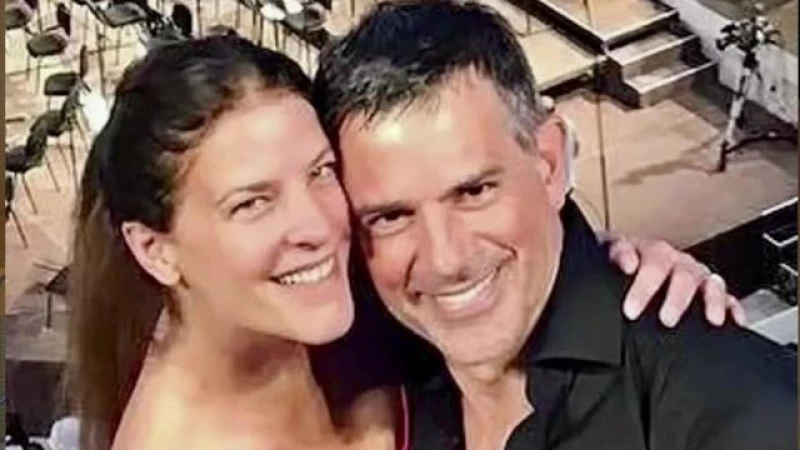It was one of the most anticipated trials in recent memory: the State of Connecticut vs. Michelle Troconis — a case that has haunted the family and friends of Jennifer Dulos for nearly five years.
"I wanted to be there every day because Jennifer couldn't be there and I wanted to be there for her to bear witness," says longtime friend Carrie Luft.
Luft was in court every day as prosecutors Sean McGuinness and Michelle Manning presented their case: that Troconis conspired with her boyfriend Fotis Dulos to murder his estranged wife, and then helped to cover up the crime. Fotis Dulos died by suicide after being charged with murder.
"This defendant was undoubtedly part of this plan to kill Jennifer Dulos. There's no if ands or buts about it," McGuinness addressed the court.
As the defendant listened in Spanish, her first language, her attorney Jon Schoenhorn described her as just another victim of Fotis Dulos.
"There is nothing to suggest that Michelle had any clue about what was gonna happen in New Canaan on May 24th, 2019. … Michelle simply did not know," Schoenhorn told jurors.
The Troconis family remains steadfast in the belief that Michelle is innocent.
"He managed to deceive all of us," Troconis' sister, Claudia Troconis-Marmol, reveals to "48 Hours" correspondent Erin Moriarty. "Initially, he seemed like an incredible guy. However, it turns out, he was a monster."
JENNIFER DULOS VANISHES
May 24, 2019, began just like any other day for Jennifer Farber Dulos, with the usual controlled chaos of preparing her five children, all under the age of 13, for school. However, shortly after 8:05 a.m., Jennifer disappeared.
Sgt. Kenneth Ventresca: She had a dentist appointment scheduled … later that morning in New York City … She never arrived at her dentist appointment.
Connecticut State Police Sergeant Kenneth Ventresca would later become one of the main investigators.
Sgt. Kenneth Ventresca: People were unable to reach her.
During the testimony, the children's nanny, Lauren Almeida, recounted her growing sense of unease.
SEAN MCGUINNESS (in court): How were you feeling at this time?
LAUREN ALMEIDA: Um, really bad. The moment I called Jennifer, my stomach just dropped because she always answered her phone.
Almeida took the children to wait at the residence of their maternal grandmother, Gloria Farber, in New York City. The 88-year-old Mrs. Farber mentions she waited for her daughter to come pick them up.
MICHELLE MANNING (in court): Did Jennifer come to your apartment that day?
GLORIA FARBER: No.
MICHELLE MANNING: Have you seen your daughter Jennifer since she failed to meet you at your apartment in New York City on May 24th, 2019?
GLORIA FARBER: No.
By 7 p.m., all-out panic set in. Almeida called police.
Lauren Almeida: We told the police that a mother of five was missing and that she was in a very contentious divorce.
Officers quickly discovered Jennifer's abandoned Suburban SUV in nearby Waveny Park.
Kenneth Ventresca (in the park): The tailgate was — was backed up against this tree. … The Suburban was not running; keys were not in the ignition. … you could see the cleanup of the blood-like substance all over the passenger side under a flashlight.
New Canaan police launched a massive search.
Sergeant Ventresca says the one person who didn't seem worried about Jennifer was the father of her five children, her estranged husband, Fotis Dulos.
Erin Moriarty: Did he help at all in the search?
Kenneth Ventresca: No, no
Erin Moriarty: Did he seem concerned about his wife as time went on?
Kenneth Ventresca: No. Never seemed concerned about his wife.
Long before their marriage, Jennifer, a writer and playwright from a wealthy New York family, and Fotis, an international water-skiing champion raised in Greece, crossed paths as students at Brown University. It wasn't until 17 years later, with a serendipitous encounter at the Aspen airport, that their relationship took a romantic turn.
Erin Moriarty: What drew her to him, and eventually made her fall in love?
Carrie Luft: Well, he had this undeniable charm. He was not only incredibly handsome but also intelligent and witty.
Not to mention, Fotis was an ambitious real estate developer and builder of luxury homes.
In 2004, Fotis Dulos and Jennifer tied the knot. Their family quickly grew to include five children — two sets of twins and a little daughter. According to Almeida, Jennifer found immense joy in motherhood.
Lauren Almeida: She would sing to them, laugh with them, and never once raised her voice. Her nurturing nature was truly remarkable.
The expanding family settled into one of Fotis Dulos' lavish residences in Farmington, Connecticut, a Hartford suburb. Despite their affluent lifestyle and a strong focus on sports, particularly waterskiing, the marriage began to encounter rough waters, as noted by Almeida.
Lauren Almeida: In a harrowing moment, I found myself in one of the kids' rooms when suddenly we heard screams and Jennifer burst through the bedroom door. Fotis was yelling, and she quickly closed the door behind her, pressing her body against it as he tried to get in. The look of terror on her face was unforgettable. Eventually, he walked away, as myself and her daughter were present.
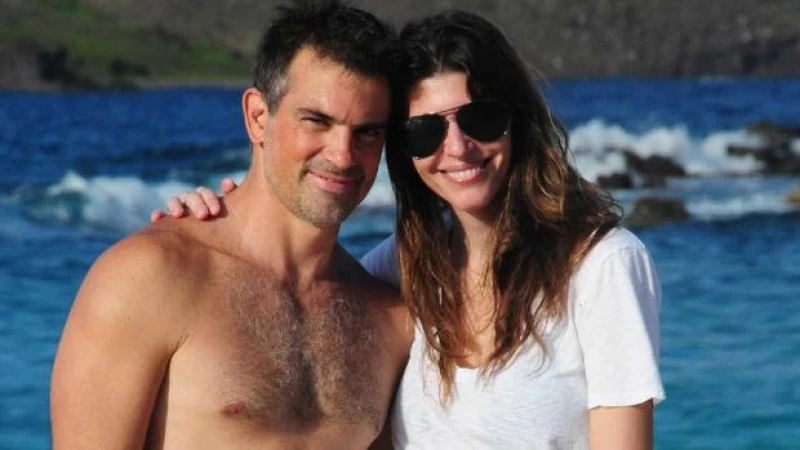
Claudia Troconis- Marmol: He had a charismatic personality and shared Jennifer's love for sports. He was also a caring father.
Soon, Fotis Dulos and Troconis started an affair, leading Jennifer Dulos to piece together the truth.
Lauren Almeida: Through emails and receipts, Jennifer discovered that Fotis had traveled to Utah with Michelle, a friend, and his girlfriend.
Jennifer later confided in me that she confronted Fotis about the affair, and he confessed. That was the breaking point. She made a secret plan to leave with the kids, seeking my help.
Lauren Almeida: She feared what Fotis might do to her or the kids if she initiated a divorce while still living under the same roof.
When Jennifer Dulos decided to file for divorce, she also made the choice to take her kids and start fresh in a rental home in New Canaan. Meanwhile, Claudia Troconis and her young daughter moved into Fotis Dulos' house in Farmington.
Claudia Troconis-Marmol: She fell in love with him and they had a very amazing relationship.
Little did Troconis know, this decision would turn out to be one of the biggest mistakes of her life.
SIGNS OF FOUL PLAY
Friends of Jennifer Dulos showed up to court every day, somber and respectful.
Carrie Luft: We did need to just bring her — her presence, the love for her into the courtroom.
For Jennifer Dulos' loved ones, there has been no body to mourn, no grave to visit. Her remains have never been found. For prosecutors, it added another set of challenges to an already difficult case. To prove beyond a reasonable doubt that Troconis conspired with Fotis Dulos to commit murder, they first had to prove there was a murder, and then, that it was Fotis Dulos who murdered her.
However, eight months after Jennifer Dulos vanished, and long before a trial would begin, Fotis Dulos died by suicide.
Jon Schoenhorn: I always thought … this trial was against a ghost.
Prosecutors essentially brought Fotis Dulos back to life by focusing on the day Jennifer Dulos went missing. They presented what investigators had found at her home.
Sergeant Kenneth Ventresca: Upon entering the house, the investigators headed to the garage where they discovered a substance resembling blood.
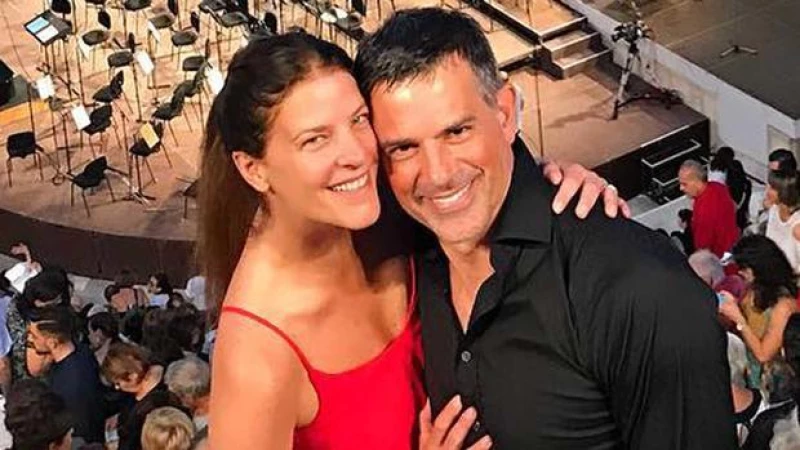
Following the alarming discovery, Sergeant Ventresca and Detective John Kimball from the State's Major Crime Squad were called to the location.
Det. John Kimball: Indications pointed towards an attempt to clean up the blood, with visible swirl marks on the vehicles' sides.
Sgt. Kenneth Ventresca: The scene in the garage indicated a severe violent assault had taken place. Foul play was evident.
Shortly after combing through the house, investigators uncovered a potential motive for Fotis Dulos - the acrimonious divorce proceedings, as detailed in court documents by Jennifer Dulos:
"He is dangerous and ruthless when he believes he's been wronged."
"… he must always win at all costs."
It was apparent that Fotis Dulos was facing significant setbacks. He had incurred substantial legal expenses, his business was failing, and he had lost joint custody of his children.
Det. John Kimball: Fotis was not one to accept defeat, especially in court against his wife.
The day after Jennifer Dulos went missing, Fotis Dulos was called in for questioning at the New Canaan Police station.
Erin Moriarty: Did he agree to sit down and talk?
Sgt. Kenneth Ventresca: No.
But they got something more important than an interview. Police took Fotis Dulos' phone.
New Canaan Police Officer Thomas Patten couldn't believe his eyes.
Erin Moriarty: What are you seeing?
Officer Tom Patten: Well, as he was driving around, he would be — he was depositing black garbage bags in various receptacles.
Erin Moriarty: And is he alone?
Officer Tom Patten: No, in one of those pictures, you can see a female that's leaning outside of the passenger side of the truck.
It turns out that female reaching for the sidewalk was Troconis. Within days, a team of detectives was dispatched to go digging through the trash.
Det. John Kimball: Well, some of the things retrieved … were used zip ties with human blood and DNA of Jennifer Dulos on them … female undergarments … a Vineyard Vines shirt in the size that Jennifer wore.
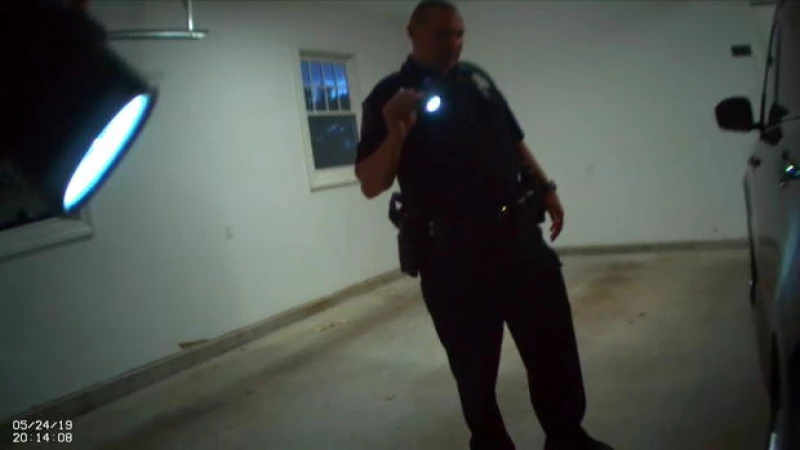
At trial for the first time, they showed those bloody clothes.
Carrie Luft: I think it was really important that they did that. … We had seen photographs of that evidence. So I knew what it looked like. … But being in the same space … the same space and time as Jennifer's clothes just really drove home that she's not here.
On June 1, 2019, eight days after Jennifer vanished, both Fotis Dulos and Michelle Troconis were arrested for tampering with or fabricating physical evidence and first-degree hindering prosecution. They still did not have enough for a murder charge.
Fotis Dulos refused to talk to police but Troconis gave the first of three interviews. Officers made it clear Jennifer Dulos was not just missing; she was murdered.
DET. CLABBY (first police interview): So basically here's a fact.
MICHELLE TROCONIS: Mm-hmm.
DET. CLABBY: Fotis killed Jennifer.
MICHELLE TROCONIS: Oh, no [crying].
DET. CLABBY: OK?
MICHELLE TROCONIS: Mm-hmm.
DET. CLABBY: This is a fact. We know this. And we —
MICHELLE TROCONIS: OK.
DET. CLABBY: — we need to find Jennifer …
Officers were trying to figure out if she knew where Jennifer Dulos' body was.
DET. KIMBALL: If you had to get rid of a body, which was no longer one piece —
MICHELLE TROCONIS: Mm-hmm.
DET. KIMBALL: — where would you go?
MICHELLE TROCONIS: Me? I never would do that.
DET. KIMBALL: Or where do you think Fotis might go? OK? I'm not saying you. Where would Fotis have gone to take either Jennifer or parts of Jennifer to get rid of her?
MICHELLE TROCONIS: Oh, God. I don't know …
Troconis insisted she didn't know anything about a body. She also gave Fotis Dulos an alibi. She told them he was with her at home that morning at 4 Jefferson Crossing.
MICHELLE TROCONIS (first police interview): Fotis wakes up, too. We — when I go to the bathroom. I brush my teeth. I get into the shower.
OFFICER: Mm-hmm.
MICHELLE TROCONIS: Fotis jumps into the shower with me.
OFFICER: Mm-hmm.
MICHELLE TROCONIS: Probably it's a 5-minute shower.
That statement would come back to haunt her.
Both Fotis Dulos and Troconis were released on bond and ordered not to communicate with one another. Fotis Dulos stayed in his glittering mansion at 4 Jefferson Crossing. Troconis moved into her own apartment and would forever be branded as the other woman.
OFFICER: I'll be honest with you. You're probably one of the most hated women in America right now.
MAKING A CASE FOR MURDER
Ten days after Jennifer Dulos disappeared, investigators found papers at Fotis Dulos and Troconis' home that they came to believe were actually "alibi scripts." A timeline, say prosecutors, that Fotis Dulos and Troconis created to keep their stories straight.
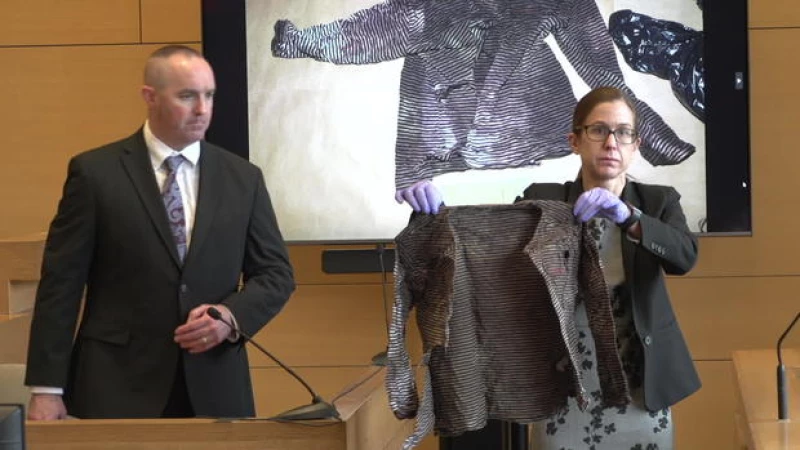
The importance of the timeline became evident in court as it was central to the State's case — not just for what it contained, but for what it lacked.
SEAN MCGUINNESS (during the trial): When questioned by the police about the absence of Hartford in her timeline, she explained that she intended to include it but was interrupted. Quite a coincidence, don't you think? Quite convenient?
Prosecutors aimed to present what they claimed was the actual timeline, commencing in the early hours of May 24 — the day Jennifer disappeared. Surveillance footage depicted a truck departing from a vacant house that Fotis Dulos had renovated for sale.
Sgt. Kenneth Ventresca: A red pickup truck was observed leaving the property, heading towards Route 4 at around 5:30, 5:35 hours.
Sgt. Kenneth Ventresca, who suspected Fotis Dulos was behind the wheel, traced the pickup truck as it made its way towards New Canaan where Jennifer resided.
Sgt. Kenneth Ventresca: We eventually located a red Toyota Tacoma pickup truck … driving southbound.
Two-and-a-half hours later, the Tacoma was seen near Waveny Park in New Canaan, just before 8 a.m.
Sgt. Kenneth Ventresca: This is where he had parked it.
Investigators theorize that Fotis Dulos brought a bicycle with him and suggest that he can be seen on surveillance footage cycling the final three miles to Jennifer's residence.
Sgt. Kenneth Ventresca: He came over in the back road over there. He waited for her to drop the kids off at school. She came home in the morning … she enters the garage … that's where the violent assault occurred in the house.
Prosecutors say that while Fotis Dulos was killing Jennifer Dulos, Troconis was back at their house, providing an alibi.
Fotis Dulos had left his phone at home and prearranged a call with a friend from Greece. Prosecutors believe Troconis picked up the call to make it appear that Fotis Dulos was home.
MICHELLE MANNING (in court): Make no mistakes, she knew exactly what she was doing when she answered that phone.
Prosecutors claim Troconis then moved it around, locking it and unlocking it to continue to show activity.
MICHELLE MANNING (in court): Now, the only person who could have reasonably manipulated Fotis Dulos' phone that morning is Michelle Troconis.
MICHELLE MANNING (in court): This is the conspiracy.
During the time prosecutors say Troconis was manipulating the phone, Ventresca believes Fotis Dulos was cleaning up the crime scene —
POLICE BODYCAM VIDEO: Yeah, it doesn't sit well with me especially because there's like a pattern here.
— and then put Jennifer's dead or unconscious body in the back of her Suburban and drove it away.
Sgt. Kenneth Ventresca: … and then her vehicle is left about three-and-a-half miles away down on Lapham Road near Waveny Park.
Just 100 feet from where police say he had parked the Tacoma.
Investigators cannot account for the next 40 minutes. It's possible Fotis Dulos used that time to get rid of Jennifer Dulos' body, but they think it's more likely that he was transferring incriminating materials from the Suburban to the Tacoma.
Det. John Kimball: If he had things to move, like a lot of bloody clothing ... It could've taken 40 minutes.
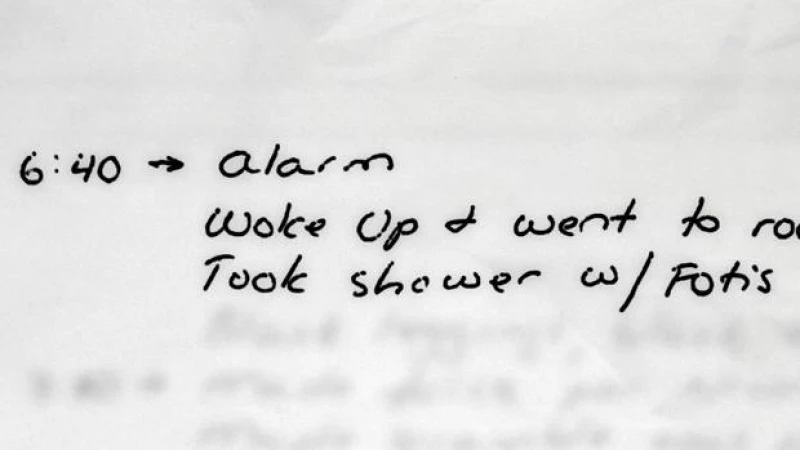
What happened to Jennifer Dulos, they don't know. What we do know is that the Tacoma returned to the empty house at 12:22 p.m.
After that, Fotis Dulos met Troconis for lunch.
DET. KIMBALL (police interview): Did you ask him where he was that morning?
MICHELLE TROCONIS: No.
That's because, prosecutors say, she already knew. That afternoon, Troconis brought cleaning supplies and garbage bags to that empty house for sale — 80 Mountain Spring Road. Troconis says she and Fotis Dulos were preparing for a showing the next day.
Erin Moriarty: So what do you think was happening that afternoon at 80 Mountain Spring?
Sgt. Kenneth Ventresca: I think that the evidence that was found in Hartford … was being bagged up.
The prosecution presented evidence of Troconis driving back and forth to the house she shared with Fotis Dulos, with prosecutors alleging that she was burning evidence.
Det. John Kimball: And there seems to be smoke emanating from the east chimney.
SEAN MCGUINNESS (during court proceedings): Who would start a fire on Memorial Day weekend? A more pressing question, who would start three fires on the Friday before Memorial Day weekend, given the weather conditions on that day? ... The surveillance footage depicts her making multiple trips, spending five minutes, then nine minutes at a time. Fire. Fire.
If the prosecution had a key witness, it was Fotis Dulos' employee, Pawel Gumienny, who also happened to be the owner of the red Tacoma. He recounted a conversation he had with Troconis a month prior to Jennifer Dulos' disappearance. Troconis was visibly upset upon learning that Jennifer had refused to allow the children to bid farewell to the family dog before Fotis had it euthanized.
SEAN MCGUINNESS (in court): What were her exact words?
PAWEL GUMIENNY: Um — can I use explicit language?
SEAN MCGUINNESS: Yes.
PAWEL GUMIENNY: She said that "that woman should be buried right next to this dog."
During the trial, Pawel Gumienny revealed a crucial piece of information about his pickup truck, a Tacoma that Fotis Dulos allegedly took without permission. Gumienny arrived at the house where Troconis and Fotis Dulos were cleaning, demanding his truck back, only to find the keys missing.
When questioned in court, Gumienny recounted Mr. Dulos saying that Michelle had the key, but Troconis had already left with them. Michelle Manning later testified that she took the keys to the Toyota Tacoma to prevent Gumienny from taking the car for the weekend, as they still needed more time before going to the car wash.
After Troconis returned with the keys, Gumienny retrieved his truck. However, five days after Jennifer Dulos went missing, Fotis Dulos took the Tacoma to the car wash, where it was meticulously cleaned.
Sgt. Kenneth Ventresca: You could practically eat off the floorboards of this truck. It was spotless by the time we inspected it.
But Fotis Dulos made a critical error when he asked Gumienny to remove the two front seats of the Tacoma and find replacements.
Testifying in court, Gumienny described Dulos growing increasingly agitated, pressuring him to remove the seats. Gumienny, later granted immunity, complied but turned the seats over to the police. The investigation revealed...
Sgt. Kenneth Ventresca: On the passenger seat … there was a blood-like stain on the fabric of the seat, which was cut out, tested at the lab, and it came back to Jennifer Dulos's DNA blood. … And that was paramount for this investigation.
They finally had enough evidence to arrest Fotis Dulos for the murder of his wife. Troconis was arrested for helping him plan the murder. The two would never see or speak to each other again.
MICHELLE TROCONIS' FAMILY SAYS SHE IS INNOCENT
Day after day, Troconis sat in the courtroom with her family behind her. She showed little emotion other than a few tears.

Jon Schoenhorn: Let me say something about not showing emotion. … If we smile as we're coming into the court … everything she does … someone is gonna comment on that.
Troconis, out on bail, left court quietly each day, but her family was outspoken.
Her father, cardiovascular surgeon Dr. Carlos Troconis, and sisters Claudia and Daniela spoke to "48 Hours" in 2020. Then, as now, they refused to believe that Michelle could have been involved in Jennifer's disappearance.
Erin Moriarty: What makes you believe that your sister had absolutely nothing to do with this?
Daniela Troconis: That's not Michelle.
Claudia Troconis-Marmol: Other women but not my sister.
Daniela Troconis: Michelle would never harm anybody, anyway.
Michelle Troconis' attorney Jon Schoenhorn says she was fooled by Fotis Dulos.
Erin Moriarty: Fotis Dulos lied to Michelle?
Jon Schoenhorn: It appears that he did on more than one occasion.
According to Troconis, Fotis Dulos told her he believed his wife had run away — something he claimed she had done in the past.
MICHELLE TROCONIS (first police interview): I said, "what, what do you mean that she disappeared?" And he said, "don't — don't worry, she's done it in the past. She went to Aspen and she changed her name 20 years ago."
OFFICER: That's false.
MICHELLE TROCONIS: I'm telling you what he told me.
Schoenhorn says Fotis Dulos was also lying to her that night he was dumping bloody evidence on Albany Avenue in Hartford.
Erin Moriarty: And you're saying she had no idea what was in those bags that Fotis was getting rid of?
Jon Schoenhorn: She not only did not know what was in those bags … she had no idea what he was actually doing. He'd invited her to go out to Starbucks. … Practically the entire time … she's on either WhatsApp, texting or making phone calls during that whole time.
DET. KIMBALL (first police interview): Do you know what was in the bags.
MICHELLE TROCONIS: No. Bueno. My mind's always like construction things. Even maybe I don't know, the cleaning from the house. I don't know.
DET. KIMBALL: OK.
Troconis-Marmol, speaking on behalf of her sister after the trial, says it wasn't unusual for Fotis to dump construction debris in public trash cans instead of paying for a dumpster.
Claudia Troconis-Marmol: I had gone in 2018, and he had done it in my presence. So it was very common for — for him to do that.
But prosecutors portrayed that footage of Troconis leaning out of the truck as something nefarious. They told the jury she was purposely giving cover to Fotis Dulos while he dumped two altered license plates down the sewer.
MICHELLE MANNING (in court): While they opened the door at the exact same time, conveniently at the right time to block the view from the tan car.
Troconis says it was an innocent gesture.
DET. KIMBALL (first police interview): You're actually leaning out at one point of the car.
MICHELLE TROCONIS: No. I told him. I, I lean — I had a, a chewing gum. I took it. I spit it. I spit it.
DET. KIMBALL: OK.
MICHELLE TROCONIS: And my hand got, uh, sticky and I went like this (demonstrates by moving her hand to the floor) and like this to clean.
The state's case was built on speculation, not facts, says Schoenhorn. Take that smoke rising from the fireplace.
Jon Schoenhorn: She would have fires going in the fireplace all the time.
Claudia Troconis-Marmol: Remember my sister lived in Argentina before. So it's very common to put the fireplace on and to just sit around … have your wine. And my sister would do it.
And, in fact, says Schoenhorn, the police brought in cadaver dogs but they never found any trace of evidence in the fireplace.
JON SCHOENHORN (in court): What was she burning in that fireplace? Firewood.
As for those missing keys to the Tacoma, Troconis-Marmol says Troconis told her that the keys had been left out in the open, sticking out of the door of the truck.
Claudia Troconis-Marmol: Culturally, we don't trust. We always lock doors. We always lock houses. Everything. … So she told me she took them … because of how we are, that she's just not gonna leave keys hanging from the door.
Erin Moriarty: If, indeed, your sister had knowledge of Jennifer's body's whereabouts ... wouldn't she have attempted to negotiate based on that information?
Claudia Troconis-Marmol: Absolutely. ... my sister is not the individual that the media, the police, and the state have painted her to be ... My sister would have spoken up. She would have taken a stand.
Ultimately, Schoenhorn argues that her sincere efforts to assist the police backfired. Troconis' apparent inconsistencies in those three interviews seemed to implicate her. At that time, she had a different legal representative.
Erin Moriarty: Do you regret her interactions with the police?
Jon Schoenhorn: Let — let's just say ... I would never have advised my client to engage with the police while under arrest.
MICHELLE TROCONIS (first police interview): Fotis joins me in the shower.
Remember, in the first interview she said she and Fotis Dulos took a shower together the morning Jennifer Dulos disappeared. But she changed that story in the second interview. She told officers she didn't see Fotis at home that morning.
DET. CLABBY (second police interview):The first time you told us that you were in the house and woke up, you took a shower with Fotis. Now you didn't take a shower with Fotis.
MICHELLE TROCONIS: OK.
DET. CLABBY: So, this is all gonna come out and it makes you look like you're not telling the truth.
MICHELLE TROCONIS: That I'm a liar, I know.
This is how she later explained it:
DET. CLABBY (third police interview): Why did you tell us things that you knew were false?
MICHELLE TROCONIS: OK, I was in shock. I was nervous.
Police and the prosecution were convinced Troconis had helped plan an alibi, including that call Troconis picked up on Fotis Dulos' phone. But Marmol says there's an innocent explanation for that, too. It turns out Fotis Dulos' friend, attorney Kent Mawhinney, was at Fotis Dulos' home office at 8:26 a.m., when Dulos' phone rang.
Claudia Troconis-Marmol: She was with Kent Mawhinney in the office. And Kent was actually the one that signaled to her, "Aren't you gonna answer the phone?" … So then she did.
But why didn't Troconis mention that phone call to investigators?
Erin Moriarty: She failed to mention the phone call in the initial two interviews. It only came up during the third interview. What was the reason for the delay? Was she intentionally concealing it from investigators?
Claudia Troconis- Marmol: No, because I don't recall every single detail word for word... Our memory can be unreliable... Just because she didn't bring it up earlier doesn't mean she was trying to hide it.
Schoenhorn brought in a memory expert, psychologist Elizabeth Loftus, to shed light on the inconsistencies in the stories.
ELIZABETH LOFTUS (in court): Individuals under significant life stress may have impaired memory function.
Next, Viorica Marian, a language and memory specialist, was called to the stand. She explained that Troconis, who followed the trial in Spanish, had only moderate English proficiency.
JON SCHOENHORN (in court): Does language proficiency impact memory recall?
VIORICA MARIAN: It can.
After three days, the defense concluded its case without Troconis taking the stand. The stage was set for the attorneys to deliver their closing arguments to the jury.
GUILTY ON ALL COUNTS
As the trial of Michelle Troconis began, Jennifer Farber Dulos had been missing for 1,594 days. In the courtroom, Carrie Luft stood as a tribute to her friend, a presence to fill the void of unbearable silence.
Carrie Luft: I was there to be a presence for Jennifer.
After weeks of testimony, it was time for the attorneys to craft their closing arguments, weaving a narrative that would tie all the pieces together in just an hour.
"48 Hours" caught up with Jon Schoenhorn as he finalized his closing statements.
Jon Schoenhorn: I feel apprehensive, but I feel that we have a good shot.
The next day, Jennifer's children, now 17, 15, and 13, sat in the gallery, living with their grandmother, as the closing arguments unfolded.
Carrie Luft: They wanted to support their mom. They wanted to support their grandmother. And they wanted to know what happened.
Prosecutor Michelle Manning was the first to present her argument.
MICHELLE MANNING (in court): This trial is very simple. It's about a conspiracy and about a coverup. It's about Michelle Troconis' actions, and about how she and Fotis Dulos conspired together to murder the woman who was standing in their way.
JON SCHOENHORN (in court): It is, and I will say this multiple times, speculation. It's conjecture. It's guesswork, which is not the standard of evidence in a criminal case here.
Prosecutor Delivers Powerful Closing Argument in Dulos Case
During the closing arguments in the Dulos case, prosecutor Sean McGuinness made a compelling case, culminating in one simple word: coincidence.
McGuinness posed a series of questions to the jury, asking them to consider whether the events in question were truly just a series of coincidences. He highlighted key moments in the case, such as the defendant answering Dulos' phone during the alleged murder and the discovery of incriminating evidence in black trash bags.
For alternate juror Patrick, who requested to be identified only by his first name, the prosecution's closing argument tied together weeks of testimony.
Patrick: Where it all came together really was in closing arguments. That's when it all made sense to me. And really up to that point, I had entertained both sides in my head.
As an alternate juror, Patrick was excused before deliberations began.
After a little more than two days, the jury sent word of a unanimous verdict to the judge: guilty.
Erin Moriarty: What did that feel like hearing "guilty"?
Jon Schoenhorn: Well, I held her arm and … I could just feel the energy leave her body. … everything was dead silent.
Erin Moriarty: Everything just stopped at that moment.
Jon Schoenhorn: Yes.
Carrie Luft: And — it was really stunning. And I guess, I mean that in the ... physical sense of being stunned and just, sort of ... Hanging on every word.
Patrick says he agreed with the verdict, including the most serious charge: conspiracy to commit murder.
Erin Moriarty: What makes you believe that she helped plan it?
Patrick: I think the totality of the evidence. Not only when I thought she was deceptive in her interviews, but even just absent of that— the moving around of Fotis' phone in the morning, the answering the phone call … Covering for him. … even if there was an explanation for it, that certainly shows that you had — some reason to do that.
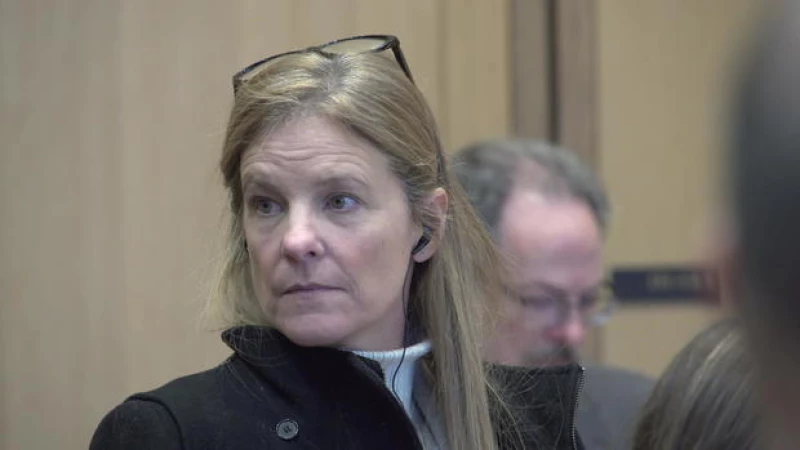
The Troconis family spoke to the press after the verdict.
The verdict brought a glimmer of hope to Jennifer Farber Dulos' family and friends, but the pain of her continued absence lingers on.
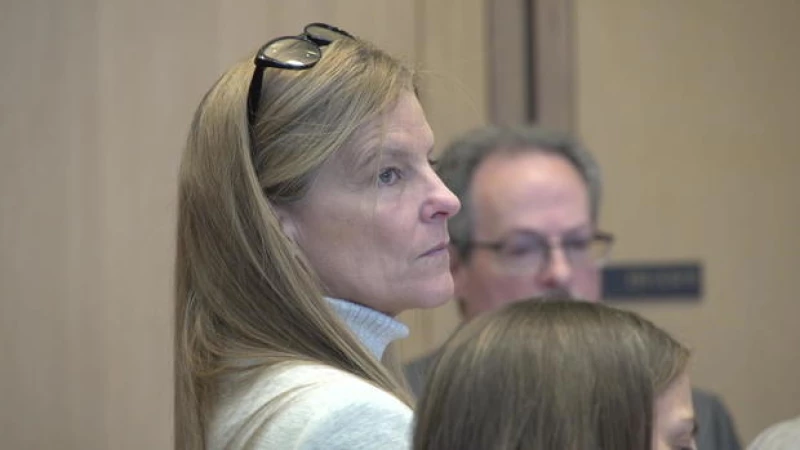
Carrie Luft: And that's what's the most painful. We don't know. We don't know where she is.
Erin Moriarty: Do you think you ever will?
Carrie Luft: I don't know.
Carrie Luft: We'd like to find her and bring her home. If that doesn't happen, it doesn't change our love for her. … she's in each of our hearts. … She's in her five children. You see her face in Gloria's. So, you know, Jennifer's still here in so many ways. But — I think it would- bring some peace to be able to let her rest in peace.
Michelle Troconis is expected to be sentenced on May 31. She faces a maximum of 50 years in prison.
A team of talented producers including Sarah Johnson, Alex Thompson, Rachel Miller, and David Lee worked on this project. Editing was done by Mark Roberts and Laura Adams. Development producers were Samantha White and Brian Wilson. Additional support was provided by associate producers Jason Brown and Megan Davis. The editing team consisted of Emily Clark, James Smith, and Lisa Green. Leading the project as senior producer was Jessica Anderson. Executive story editor for the project was Rebecca Turner, and overseeing the production as executive producer was Michael Roberts.

